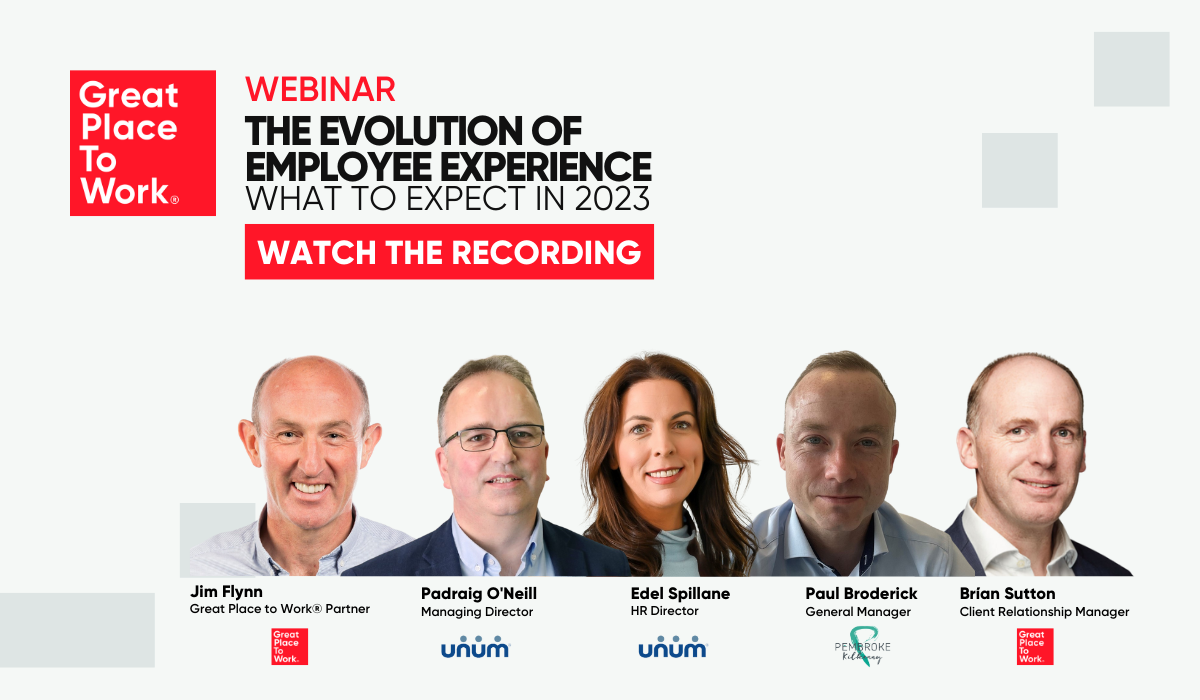A changing workplace environment, specifically shifting towards a more remote and hybrid working style, has significant implications on the ability of an organisation to create a quality work environment.
We had the pleasure of hosting expert guest speakers for this webinar. These included Padraig O'Neill, Manager Director, Edel Spillane, HR Director of Unum and Paul Broderick, General Manager at Pembroke.
They joined us to share some practical insights on how to make the transition meaningful and sustainable for both employees and the organisation. They also shared how to leverage the employee story to enhance your brand's customer experience.
Padraig O'Neill, Manager Director and Edel Spillane, Head of HR at Unum


1. Unum position themselves as a technology business that sells insurance rather than an insurance company that uses technology. They have always believed that the traditional insurance business had to be transformed and that is something truly anchored in their cultural mindset.
2. After the pandemic, it was imperative for Unum to first explain the purpose to come together. This was to engage managers to build discussion, addressing the values that come with the purpose itself. Managing change began with communicating with managers who would then support the employees.
3. A huge advantage in embarking talent on Unum's journey was the importance of culture and brand when facing change. By having settled their purpose and values, the level of clarity that they were able to bring to the broader discussions gave them guide rails. This helped them to make sure that they came up with something that was sustainable for the company.
4. Unum created “Our Unum”, their engagement work stream and committee where all the management teams are involved and provides a way for them to engage with their employees directly. As a result, they were able to gain valuable insight into the culture of their company from them.
5. Their committee has allowed them to organise actions to promote a sense of unity in the company and reinforce employee sense of belonging at Unum.
6. Through initiatives such as "The 11s," groups can connect with each other. At quarter to eleven, people come down to their canteen to reconnect, so it's getting people out of their workplace environment they usually engage with on a daily basis.
🎙️🎧Listen to the “Godfather of Remote”, John Riordan, Chairman of Grow Remote and formerly Chairman of Shopify International on the Red Cube Podcast, here. 👈
Paul Broderick, General Manager at Pembroke Kilkenny
.png?width=286&height=286&name=%23F5F8F6%20(1).png)

1. Paul introduced the topic by asking the following question to the audience: “What kind of business would you like to work in?” to explain the importance of having a purpose in a company along with working on a compelling Employee Value Proposition.
2. In 2009, after the financial crash affecting the hotel industry Pembroke Kilkenny was created and Paul joined in 2010 to build the team that will contribute to the success of the business.
3. In 2013, Pembroke Kilkenny introduced the EFQM (European Foundation for Quality Management) and focused on their people to ensure business growth.
4. In 2015, Pembroke Kilkenny was awarded the EFQM Level 4 Award and as the business and team grew bigger they introduced their own business framework called "The Pembroke Way” to translate their purpose for people to understand easily the playbook and their management accountabilities.
5. Paul explains that translating the model into what it means for each individual acted as a way to simplify some of the complicated language. This helped to clarify the management accountabilities for their team. This included what they have to do around their people and a clear understanding of how they can make them successful.
6. According to Pembroke Kilkenny’s Great Place to Work Trust Index survey results, there is significant clarity around the “level of responsibility people have” and “how small micromanagement there is”.
7. Pembroke Kilkenny took the opportunity to leave the long established recognised human resources models and frameworks (e.g. competency models) to develop their own model. This created a seamless linkage from their vision and team message into a concrete set of values and actions to ensure long term business success.
Watch the webinar recording below 👇

About Great Place to Work®
Great Place to Work® is the global authority on workplace culture. We help organisations quantify their culture and produce better business results by creating a high-trust work experience for all employees. We recognise Great Place to Work-Certified™ companies and the Best Workplaces™ in more than 60 countries. To join the thousands of companies that have committed to building high-trust company cultures that help them attract, retain and take care of their people, contact us about getting Certified today.
